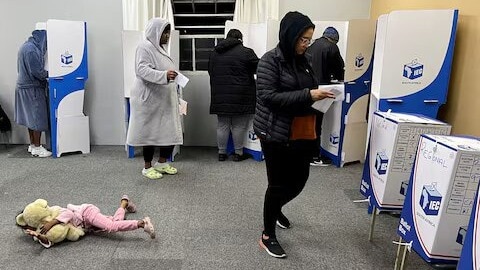2024-06-02 08:09:54
South Africa’s Independent Electoral Commission said it will continue to declare on Sunday afternoon the final results of the country’s general and provincial elections despite threats to postpone the process to allow further submissions on alleged irregularities.
At a media briefing late on Saturday, Independent Electoral Commission (IEC) CEO Mosotho Moepya confirmed that the authority will work through the night to resolve the 579 objections that have been received in order to proceed with the scheduled declaration, at which President Cyril Ramaphosa will speak.
Moepya expressed confidence in the transparency of the systems put in place by the IEC to ensure “credible, free and fair elections”.
Earlier in the evening, former president Jacob Zuma, speaking on behalf of 26 of the smaller parties in the election, called on the IEC to allow them more time to lodge what he said were many more “serious” objections that the parties needed to prepare information on, although he did not share any details of the allegations.
“We are going to need time. Nobody must declare tomorrow (Sunday). No!” Zuma said emphatically as he threatened that it would “provoke people” if the IEC proceeded with its plan for Sunday.
“Nobody is going to die if the results are not announced tomorrow,” Zuma said.
“Don’t start trouble when there is no trouble,” he cautioned the IEC and added that there was a need for a commission of inquiry into the complaints because “those being in charge cannot investigate themselves”.
If the IEC persists with its plan, the 26 parties would be compelled to seek legal intervention, he cautioned.
Moepya said that although all complaints had to be received by the IEC within 48 hours of the election ending at 9 pm on Wednesday, the authority allowed an extension till 6 pm on Saturday.
Zuma is the leader of the Umkhonto we Sizwe (MK) party, which was launched a few months ago and caused major upsets by winning the greatest number of votes in his home province, KwaZulu-Natal.
It ended the majority held by the African National Congress (ANC) in that province.
MK also secured substantial votes in other provinces, with analysts crediting it for having played a major role in reducing to just over 40 per cent the majority that kept the ANC in power since Nelson Mandela first led it to victory in 1994.
Although the ANC got the highest number of votes nationally, it did not achieve the required 50 per cent plus one required to form a government.
Legal advisors and analysts on several channels were unanimous that the IEC was operating fully under the prescripts of the law and the Constitution in its tasks.
south africa elections, african national congress, south Africa IEC, zuma threat,
Source link
![]()
